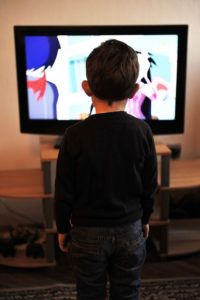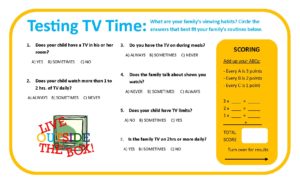TV is probably a bigger presence in your home than you realize.
The average child in the U.S. spends 900 hours in school per year and over 1,020 hours per year watching TV.
When you add to TV other screen hours spent on gaming, social media, and movies that figure almost doubles to over 1,690 hours per year of screentime.
And what is an even scarier statistic is that over 81% of children ages 2-7 watch TV without any adult supervision.

The effects of this are many:
- 56% of 6-year-olds in households where the TV is on “most” or “all of the time” can’t read.
- 30% of teens nationwide are overweight or obese.
- By age 18, the average child had witnessed more than 200,000 violent acts on TV, 16,000 of which are murders.
Excessive TV watching has been proven to delay language and literacy skill development in young children, and there have been numerous studies that show the correlation between hours of TV consumed and lack of daily physical activity, as well as eating larger portions of carbohydrates during TV viewing.
TV can also have negative impacts on relationships, consuming more than 2 months of family time every year in the average American household, and normalizing ideas about extreme violence and aggression.
However, studies also show that TV isn’t necessarily an evil. It can also be a medium for learning valuable knowledge and expanding relationships.
Parents who carefully select educational programming, and who watch and talk through shows with their children, create an environment where the positive effects of media can outweigh potential negatives.
Setting and enforcing TV time limits is another aspect of utilizing screentime for the positive.
“It’s not that TV is inherently bad,” says Rahmed Alneen of the American Academy of Pediatrics (AAP), “It’s that it plays too big of a role in most of our homes.”
Parents who are thinking about reducing TV’s influence on their family can review the benefits of limited viewing time:
1. More Time for Relationships
Recoup valuable time to enjoy with friends and family simply by cutting back your TV time by an hour or 2 every day. Healthy relationships have proven to be a great predictor of happiness and wellbeing, so every hour spent on building into these mutual supports is a wise investment.
2. Increased Likelihood of School Success
Language & literacy skills are the building blocks of school success, and babies learn these in person to person interactions, not from media exposure. Talk, read, and play with your child from birth to Kindergarten, and reap the rewards as they grow ready to succeed in school! No preschooler needs TV time.
3. Consume less, Save More
Kids see an average of 40,000 commercials per year in the U.S. aimed directly at them. Reduce their exposure to consumer influence and spend less money due their prompting for certain toys, foods, and treats simply by cutting back on TV time.
4. Greater Health Habits
It has been proven that kids move more when they engage in play, rather than screentime. Watching lots of TV everyday impacts child health in every way from the size of the capillaries in their eyes to the stress on their heart and lungs. For every hour above 2 that a child engages in media consumption the AAP recommends an extra hour of outdoor active play as a healthy counter balance.
Testing TV Time – What are your family’s viewing habits?
Here is a test to gauge how much time and influence TV plays in your home!

If you decide you’d like to reduce the time your family spends on TV, a good way to start is to come up with some specific suggestions on how to capitalize on this new non-TV time. Here is a free list that you can use to jump start your ideas!







